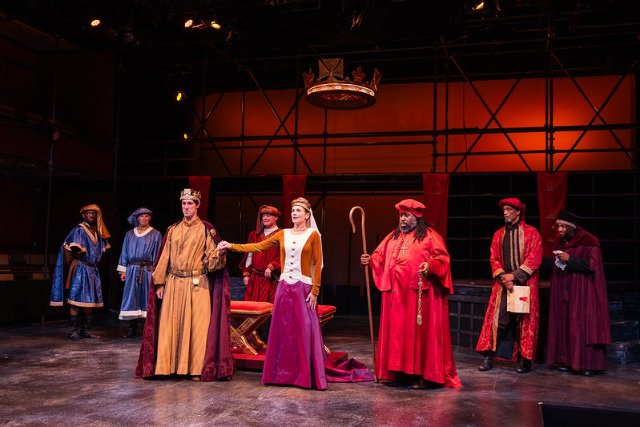The Contention (Henry VI, Part II)
Rarely Seen Play at Shakespeare & Company
By: Charles Giuliano - Jun 25, 2023
The Contention (Henry VI, Part II)
By William Shakespeare
Directed by Tina Packer with associate directors Kate Kohler Amory and Sheila Bandyopadhyay
Set by Sarah Edkins; Lighting, James McNamara; Costumes, Kiki Smith; Sound, Brendan F. Doyle; Violence designer, Martin Jason Asprey
Cast: Henry/ Bolingbrook, David Bertoldi; Suffolk/ Cade, Allyn Burrows; Gloucester/ Clifford, Jonathan Epstein; York/ Dick, Nigel Gore; Margaret, Tamara Hickey; Warwick/ Holland, L. James; Dutchess of Gloucester, Sea Captain, Michael, Citizen, Richard, Messenger, Bella Merlin; Cardinal/ Horner, Jacob Ming Trent; Somerset/ Hume, Kenneth Ransom; Jourdain/ Vaux, Austyn Williamson
Tina Packer Playhouse
Shakespeare & Company
June 17-July 15
The production of The Contention (Henry VI, Part II) underscores the artistic and creative essence of Shakespeare & Company. There is admirable dedication to presenting the full range of works by William Shakespeare. The plays are superbly executed by skilled and refined actors with passion and precision. They execute the demanding language with fluid naturalism.
Under the direction of Tina Packer, with associate directors Kate Kohler Amory and Sheila Bandyopadhy, there is palpable demonstration of a company, in every sense, and players who have worked together for many years.
The original title of one of the Bard’s first plays was The First Part of the Contention betwixt the two famous Houses of York and Lancaster, with the death of the good Duke Humphrey: And the banishment and death of the Duke of Suffolk, and the Tragical end of the proud Cardinal of Winchester, with the notable rebellion of Jack Cade, and the Duke of York’s first claim unto the Crown.
That’s it in a nutshell.
The end of the play, an abrupt amputation, sets into motion the dynamics of the “contention” between the houses of York and Lancaster for the crown. In Shakespeare’s time this was referred to as “The Civil Wars” which later was more romantically known as the “War of the Roses.”
The heraldic badges included the white rose of York and the red rose of Lancaster. Henry Tudor (Lancaster) defeated Richard III (York) at Bosworth. After Henry's victory and marriage to Elizabeth of York, the heir of Edward IV, the two roses were combined to form the Tudor rose, to symbolize the union of the two claims.
While Henry VI, Part II is considered to be the best of a trilogy it is rarely produced. In Packer’s effort to promote the play she states that the struggle for power is timely and likely inspired the epic saga Game of Thrones.
By any measure, however, it’s a long evening on unforgiving benches with a play that is less than memorable. We sat at 7:30 PM and with intermission departed at 10:30 PM. The long first act slogged through a lot of obscure exposition. It doesn’t help that the titular character is a weak, snivvely, vacillating, twit who would rather not be king.
Matters start badly with lopsided evidence of why he is not fit to rule. The Duke of Suffolk (Allyn Burrows) has delivered to his Majesty a French bride, Margaret (Tamara Hickey) who he has married by proxy. Suffolk has been the worst possible ambassador. He has sampled the fruit and plans to continue as her lover for amorous as well as strategic reasons. Negotiating with no dowry he has in fact done quite the opposite by surrendering hard fought for properties to the French king.
Henry accepts this without a word of quibble though it roils his court. We wonder what asset has she brought to the marriage?
A spine proves to be the answer. When the Duke of York (Nigel Gore) has Henry on the run at the end of Act II he ducks for cover while she brandishes a sword.
The first act underscores Henry’s inability to control power struggles of the court. His staunchest and most loyal ally has been Gloucester (Jonathan Epstein). The king has relied on him from an early age. The plot against him is intended to weaken the king.
Gloucester’s wife (Bella Merlin) is accused of necromancy and dragged off in exile.
Then he is accused of treason which the King doubts but declines to intervene. Gloucester is murdered in his cell. The Cardinal (Jacob Ming Trent) who is involved in the plot dies suddenly.
There is a screed of genealogy as York (Nigel Gore) delineates the family tree culminating in his rightful claim to the throne. He is assigned by Henry to squash rebellion in Ireland. It’s a typically wrong headed move by Henry as he provides a rival with armed men; although York pledges allegiance and sons as hostages.
There could not be a more vivid difference between the first and second act. Compared to the plodding academic history lesson of the first act, the second erupts into hilarious farce and outrageous Grand Guignol.
With York in Ireland he has left in command a ruffian underling Jack Cade (Allyn Burrows) and his sidekick Dick the Butcher (Nigel Gore). Hilariously heads roll piling up in a basket.
It’s here that we settled back and reveled in the marvel of this company. Actors killed off in the first act return in the second. A cast of ten is stretched to over 30 roles.
Kudos in particular to the versatile and brilliant Bella Merlin who portrays an unhinged woman in the first act then a juggler’s trick of five male roles in the second. It’s flat out brilliant.
We were smothered under the blanket of comedy by Burrows and Gore. True, the second act was long, but we loved every minute of the farce and swashbuckling combat. The audience was rolling in the aisles.
Yet again it demonstrated why Elizabethan audiences gorged on bloody beef with Yorkshire Pudding. In this case House of York pudding.

